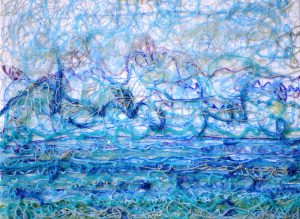An Interview with Featured Artist Regina Valluzzi

By Cynthia Reeser with Regina Valluzzi
Dr. Regina Valluzzi has always pursued art in tandem with her technical achievements in Nanotechnology and Biophysics. She is a trained scientist, with a BS in Materials Science from MIT and a PhD in Polymer Science from University of Massachusetts Amherst. She has spent years as a researcher in the Chemical, Physical, and Biological Sciences. Dr. Valluzzi’s scientific experience is evident in her approach to painting as both an art and a science. She has been able to conduct systematic experiments with artistic media. For many years her science has revolved around the topics of polymers and optical phenomena, and these twin fascinations are present in much of her art. Her paintings are very much about the properties of polymer-based paints and manipulation of those properties.
Relief, texture, opacity, and surface finish are as integral to her work as form, composition, and subject (abstract). Many of her paintings involve juxtapositions of colors with very low contrast or rhythmic patterns of evolving color. Others play with metamerism, arising from spectral properties of pigments. In others, color is intensified through careful choice of layered and nearby hues and pigments. Dr. Valluzzi has shown in several juried exhibitions, and her work is included in private collections in the U.S., U.K., Japan, the Netherlands, Switzerland, Bulgaria, and Malta.
Cynthia Reeser (TRon): One thing I find especially exciting about your work is that you achieve a cohesion of both art and science, rendered pictorially. I think of many of your pieces as representations of what one might see under the microscope, but on closer inspection, I think there is more to your work than simple representation. Can you talk about your approach to your artwork, as both a scientist and artist?
Regina Valluzzi: It is interesting that you mention microscopes. I spent my PhD in a group that worked primarily with electron microscopy, and used advanced microscopies for many years after that in my scientific research. In general, artists are advised to paint what they know. Most of the big-name famous artists started with realism, then applied their creativity. The evidence of natural forms is still visible even in their highly abstract work (look at Mondrian, for example). In my case, I’ve spent so much of my life looking at data, analyzing data, developing images that help people mentally map complex scientific data, and illustrating and visually communicating scientific concepts that it’s almost inevitable to see science even when my work is not expressly science-themed. There is also a secret visual semiotics of science that one first encounters in graduate school. It serves an important function, but the rules are so arbitrary. Now that I’m doing the art thing, I like to honk the sciences’ semiotic nose when I can.
CR: Is there a point at which science and art meet for you—be it color or texture or someplace else?
RV: There are a lot of scientific ideas that are inherently very abstract. The sciences have one set of rules for portraying these ideas, but the cost of clarity is often oversimplification and loss of some of the most intriguing little bits. So in some cases, the switch from technical illustration to art is simply a rules change for me. There are also a lot of very basic forms and color juxtapositions that are not found in everyday life unless there are big, fancy instruments in one’s everyday life. I incorporate some of these forms, derived from data, into much of my work.
Another meeting is simply in my approach to media. Experimental scientists like to experiment, and we become pretty adept at making sure our experiments go somewhere and give us knowledge to build upon. I experiment with paint and media and use my understanding of phenomena like viscoelasticity, refractive index, spectroscopy, etc., to build up a knowledge base of techniques from those experiments. I’ve also learned that it’s generally better to just DO low-risk and low-cost experiments than to spend hours talking about why they might or might not work. Art experiments are low-cost. The materials aren’t terribly expensive (and some can be repurposed), and a failed experiment doesn’t blow up the lab (seen that) or release a toxic gas cloud (seen that too) or have any other potentially dangerous and terrifying results. So why not try it, take some notes, and learn something?
See Regina Valluzzi’s work in the following upcoming exhibitions:
“Aesthetic Experiments” Solo Exhibition, Remis Gallery, Governor’s Academy, Newbury, MA
February 5 – March 7, 2014; Reception February 7, 2014.
Red Wall Gallery at the Contemporary Art Fair, Javits Center, NYC, NY, October 25 – 27 2013
~
Visit Regina Valluzzi on the web at: http://nerdlypainter.wordpress.com/
============================================================================
 Dr. Regina Valluzzi has always pursued art in tandem with her technical achievements in Nanotechnology and Biophysics. She is a trained scientist, with a BS in Materials Science from MIT and PhD in Polymer Science from University of Massachusetts Amherst. She has spent years as a researcher in the Chemical, Physical and Biological Sciences. Dr. Valluzzi’s scientific experience is evident in her approach to painting as both an art and a science. She has been able to conduct systematic experiments with artistic media. For many years her Science has revolved around the topics of Polymers and Optical phenomena, and these twin fascinations are present in much of her art. Her paintings are very much about the properties of polymer-based paints and manipulation of those properties. Relief, texture, opacity, and surface finish are as integral to her work as form, composition, and subject (abstract). Many of her paintings involve juxtapositions of colors with very low contrast or rhythmic patterns of evolving color. Others play with metamerism, arising from spectral properties of pigments. In others, color is intensified through careful choice of layered and nearby hues and pigments. Dr. Valluzzi has shown in several juried exhibitions, and her work is included in private collections in the US, UK, Japan, the Netherlands, Switzerland, Bulgaria, and Malta.
Dr. Regina Valluzzi has always pursued art in tandem with her technical achievements in Nanotechnology and Biophysics. She is a trained scientist, with a BS in Materials Science from MIT and PhD in Polymer Science from University of Massachusetts Amherst. She has spent years as a researcher in the Chemical, Physical and Biological Sciences. Dr. Valluzzi’s scientific experience is evident in her approach to painting as both an art and a science. She has been able to conduct systematic experiments with artistic media. For many years her Science has revolved around the topics of Polymers and Optical phenomena, and these twin fascinations are present in much of her art. Her paintings are very much about the properties of polymer-based paints and manipulation of those properties. Relief, texture, opacity, and surface finish are as integral to her work as form, composition, and subject (abstract). Many of her paintings involve juxtapositions of colors with very low contrast or rhythmic patterns of evolving color. Others play with metamerism, arising from spectral properties of pigments. In others, color is intensified through careful choice of layered and nearby hues and pigments. Dr. Valluzzi has shown in several juried exhibitions, and her work is included in private collections in the US, UK, Japan, the Netherlands, Switzerland, Bulgaria, and Malta.
 Cynthia Reeser is the Founder and Publisher of Aqueous Books, and Founder and Editor-in-Chief of Prick of the Spindle literary journal. She has published more than 100 reviews in print and online, as well as poetry and fiction in print and online journals. Her short stories are anthologized in the Daughters of Icarus Anthology (Pink Narcissus Press, 2013), and in Follow the Blood: Tales Inspired by The Hardy Boys and Nancy Drew (Sundog Lit, 2013). Cynthia is currently working on a literary short story collection inspired by fairy tale lore. Also a senior editor for two association management companies, she lives and works in the Birmingham area and attends the University of Tampa in pursuit of her MFA in Creative Writing (fiction). Visit her on the web at www.cynthiareeser.com.
Cynthia Reeser is the Founder and Publisher of Aqueous Books, and Founder and Editor-in-Chief of Prick of the Spindle literary journal. She has published more than 100 reviews in print and online, as well as poetry and fiction in print and online journals. Her short stories are anthologized in the Daughters of Icarus Anthology (Pink Narcissus Press, 2013), and in Follow the Blood: Tales Inspired by The Hardy Boys and Nancy Drew (Sundog Lit, 2013). Cynthia is currently working on a literary short story collection inspired by fairy tale lore. Also a senior editor for two association management companies, she lives and works in the Birmingham area and attends the University of Tampa in pursuit of her MFA in Creative Writing (fiction). Visit her on the web at www.cynthiareeser.com.










